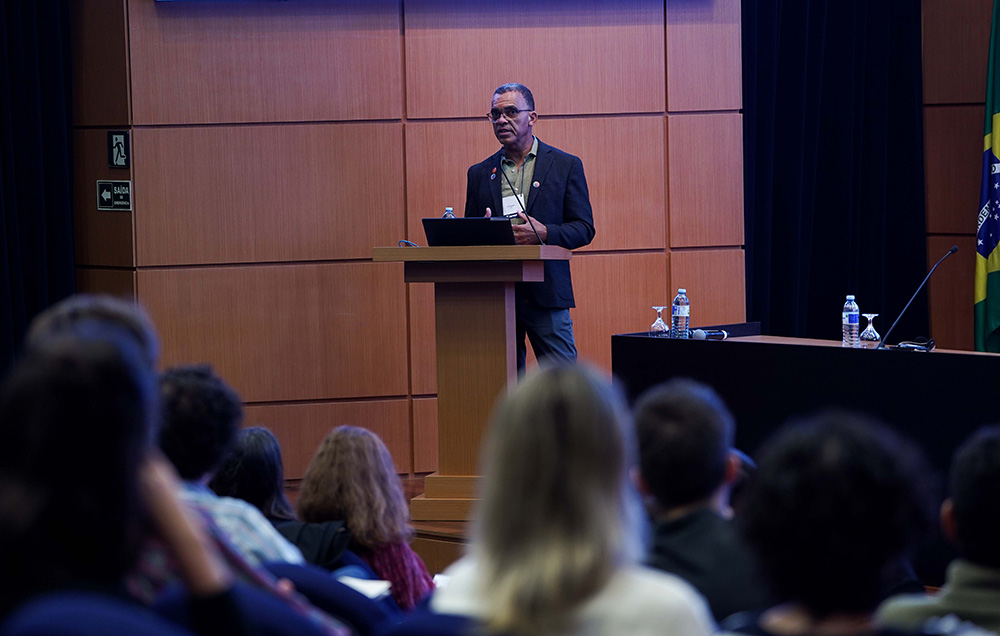


The event was held at FAPESP on April 25th (photo: Daniel Antônio/Agência FAPESP)
Published on 05/12/2025
By André Julião | Agência FAPESP – Before the 30th United Nations Climate Change Conference (COP30) attracts the world’s attention in November in Belém, in the Brazilian Amazon, an event scheduled for June could set the tone for the negotiations that will take place in the capital of Pará state. The Oceans Conference in Nice, France, will discuss the relationship between the oceans and global climate change.
“It’ll be a place where discussions can take place, where we can integrate different principles from different conventions so that they work in a unified way, rather than in isolation,” pointed out David Obura, chairman of the Intergovernmental Platform on Biodiversity and Ecosystem Services (IPBES), during the FAPESP Conference “Contributions to COP30: Ocean, Biodiversity and Climate Nexus,” held on April 25th at the Foundation’s headquarters.
At the helm of IPBES since September 2023, “a younger brother of the IPCC [UN Intergovernmental Panel on Climate Change],” as he puts it, Obura is the founder of Cordio East Africa, a Kenya-based organization focused on coral conservation.
Although he has done most of his research on the east coast of Africa, Obura believes that the concerns of African countries bordering the Indian Ocean are very similar to those of Brazil. “They revolve around people’s interaction with nature and how we provide sustainability and ecosystem services,” he said.
According to the researcher, an important victory for including the oceans more prominently in climate discussions came during COP26, which took place in Glasgow, Scotland, in 2021. It was the first COP he attended as part of the Kenyan delegation.
“We got agreement from all countries to include oceans in the COP discussions, but not as a separate work stream, because countries already have to deal with several negotiation streams, but really to understand how oceans connect with all parts of the climate negotiations, which is very appropriate,” he said.
Obura recalled that climate change is one of the main causes of biodiversity loss around the world, and the importance of nature in mitigating and adapting to climate change is becoming increasingly clear.
“If nature’s ability to provide these services is compromised, these services will also be lost. That’s why it’s so important to really understand what nature’s limits are,” he said.
Point of no return
The chairman of IPBES explained how the platform, created in 2012, works and how it has made important contributions both in diagnosing the state of the world’s biodiversity and ecosystem services and in proposing solutions. The latest reports were published in December 2024.
In the case of corals, his specialty, Obura recalls that they act as flagship species for ocean conservation because the public can better understand the risk they face, even if only by watching videos and looking at photos, compared to other oceanic topics.
“It’s an underwater ecosystem. You can just go and see it under the water by diving or just looking through the bottom of a bottle. There’s a lot of power in the message of coral reefs,” he said.
For Obura, corals are a socio-ecological element to explain the so-called points of no return, changes in the environment so drastic that they must be contained before they become irreversible.
“Our challenge as scientists is to communicate to decision-makers and the public the importance of this system, with complex interactions that are highly relevant to people and that could change forever, soon, or even have already passed the point of no return,” he said.
The researcher recalled that the Intergovernmental Panel on Climate Change, in its 2023 report, identified a global temperature increase of 1.5 °C to 2 °C as a critical range of warming that could lead to the loss of 70% to 90% of corals. The devastation could reach 99% if 2 °C is reached.
“We need to make decisions about this this year, not ten years from now,” he warned.
In the debate that followed the lecture, physicist Paulo Artaxo, member of the coordination of the FAPESP Research Program on Global Climate Change (RPGCC), recalled that, at the current rate, warming of 4 °C to 4.5 °C is projected for the end of the century.
“The population hasn’t yet woken up to this fact,” he said.
The debate also included Beatrice Padovani Ferreira, professor at the Federal University of Pernambuco (UFPE), and Regina Rodrigues, professor at the Federal University of Santa Catarina (UFSC), with the mediation of Sabine Righetti, advisor to FAPESP’s General Coordination – Science Media. The event was opened by the scientific director of the Foundation, Marcio de Castro.
The event can be viewed in its entirety at: fapesp.br/17506.
Source: https://agencia.fapesp.br/54719